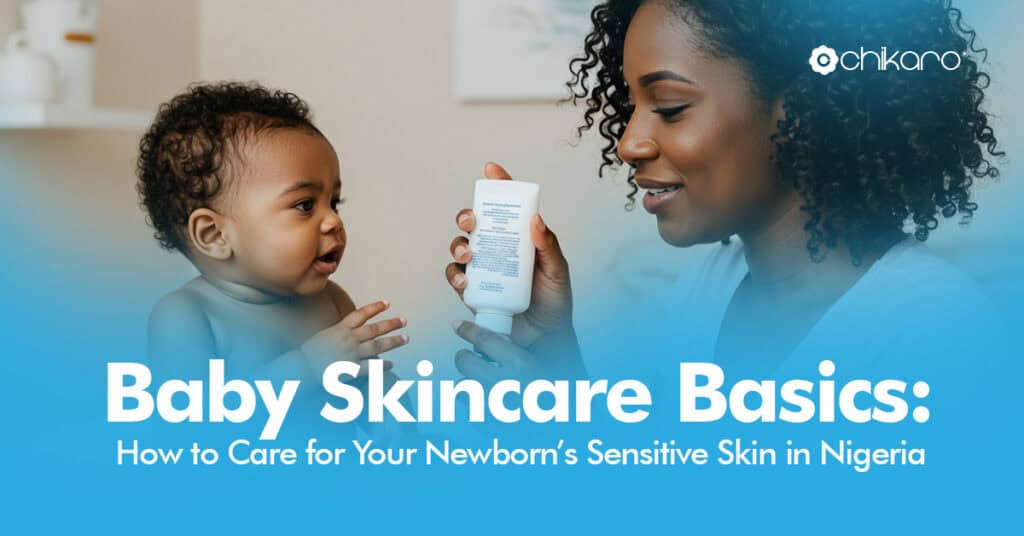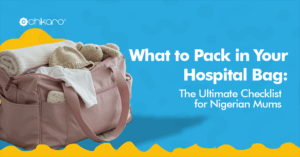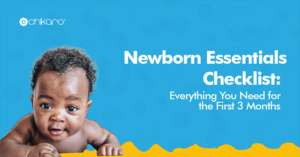According to WebMD, Whether your baby is 6 days, 6 weeks, or 6 months old, there’s always one constant: They have delicate skin. Your baby’s skin is soft, sensitive, and still adjusting to life outside the womb. From dry patches to prickly heat, it’s common for Nigerian mums to wonder: “Is this normal?” If you’ve ever panicked over a tiny rash or worried about dryness, you’re not alone.
Nigeria’s unique weather conditions – heat, humidity, dust, and the dryness of harmattan – can make newborn skincare feel tricky. But with the right knowledge and gentle products, you can master baby skincare basics and protect your little one’s skin with confidence.
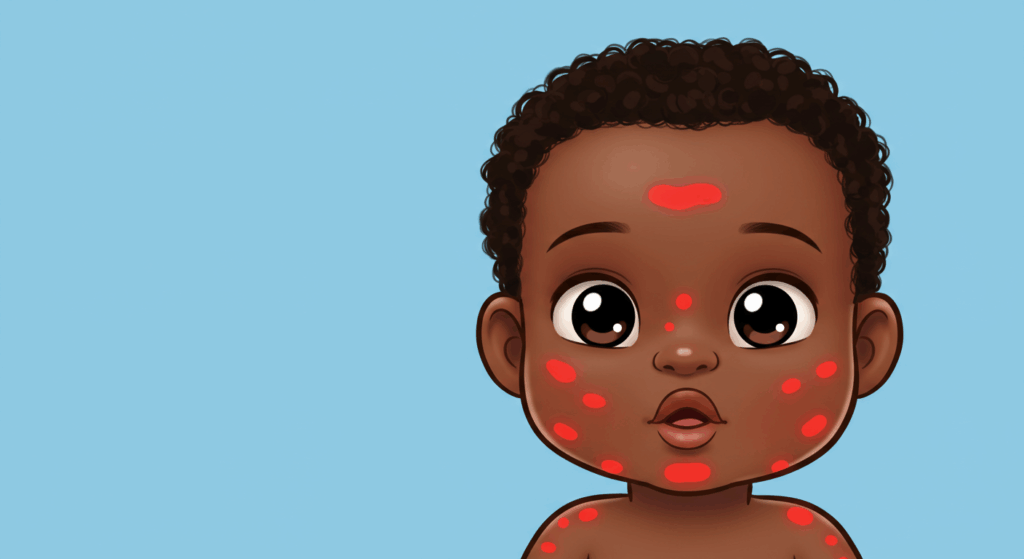
This guide is here to help Nigerian mums navigate baby skincare basics step by step, with practical tips that work in our climate and culture.
Understanding Newborn Skin
Before diving into products and routines, it’s important to understand what makes your baby’s skin so different from yours. This foundation is where baby skincare basics begin.
- Thinner and more sensitive: Baby skin is about 30% thinner than adult skin, which means it absorbs products faster and is more vulnerable to irritation.
- Prone to dryness: Their natural oil production is still developing, so moisture balance is fragile.
- Delicate immune system: Because their skin barrier isn’t fully mature, babies are more likely to react to dust, sweat, or harsh products.
Recognizing these differences is at the heart of baby skincare basics. It teaches us why less is more, why we need mild formulas, and why patience is key when rashes appear.
Common Baby Skin Issues in Nigeria (and How to Handle Them)
Every Nigerian mum will face at least one of these skin concerns in the first few months. The good news? Most are normal and temporary. Here’s how baby skincare basics apply to each one.
1. Heat Rash (Prickly Heat)
- Cause: Blocked sweat glands, especially in hot, humid weather.
- Appearance: Tiny red bumps on the neck, back, and armpits.
What to do:
- Dress your baby in lightweight cotton clothes.
- Bathe with lukewarm water.
- Use a light dusting of cornstarch-based powder (avoid talc).
Baby skincare basics in Nigeria mean choosing breathable fabrics and keeping babies cool in the heat.

2. Dry Skin & Peeling
- Cause: Common in newborns, worsens during harmattan or air conditioning.
- Appearance: Flaky skin, especially on hands, feet, and legs.
What to do:
- Apply unscented baby lotion or natural oils like coconut oil.
- Don’t over-bathe (3–4 times weekly in cooler weather is enough).
Here, baby skincare basics remind mums to moisturize more during dry seasons.
3. Cradle Cap (Infant Scalp Flaking)
- Cause: Overactive oil glands.
- Appearance: Yellow, crusty patches on the scalp.
What to do:
- Apply baby oil before bath, gently brush with a soft comb.
- Wash hair with mild baby shampoo 2–3 times weekly.
Baby skincare basics encourage gentle handling – no forceful scrubbing.
4. Baby Acne
- Cause: Hormonal transfer from pregnancy.
- Appearance: Small red or white pimples, mostly on the cheeks.
What to do:
- Cleanse gently with warm water.
- Avoid adult creams or harsh scrubbing.
- Usually clears within weeks.
One of the simplest baby skincare basics is: leave acne alone.
5. Nappy Rash
- Cause: Prolonged contact with wet diapers, especially in Nigeria’s hot climate.
- Appearance: Red, inflamed skin in diaper area.
What to do:
- Change diapers frequently.
- Use zinc oxide-based cream.
- Allow diaper-free time daily.
This is one of the most common issues where mums rely on baby skincare basics for quick relief.
Daily Baby Skincare Routine
Baby skincare basics are best practiced daily. A simple routine keeps skin clean, moisturized, and protected
Morning:
- Wipe face and neck folds with lukewarm water.
- Moisturize lightly, especially in harmattan.
Bath Time (once daily or every other day):
- Use mild, fragrance-free soap.
- Avoid long baths (5–10 minutes is enough).
- Pat skin dry—don’t rub.
Night:
- Reapply lotion if skin feels dry.
- Gentle massage with natural oils to promote sleep and bonding.
Baby skincare basics show us that routine builds comfort for both mum and baby.
Baby Skincare Basics for Nigerian Weather
Nigeria’s climate plays a huge role in how we care for babies’ skin.
In Hot Weather:
- Bathe more often to remove sweat.
- Keep the room well-ventilated.
- Use lightweight cotton clothes and bedding.
During Harmattan:
- Moisturize 2–3 times daily.
- Use humidifiers or place bowls of water in baby’s room.
- Protect lips and cheeks with baby-safe balm.
Baby skincare basics change with the seasons. Nigerian mums need to adapt care depending on the weather.
Best Baby Skincare Products for Nigerian Mums
When choosing products, keep baby skincare basics in mind: mild, fragrance-free, and natural.
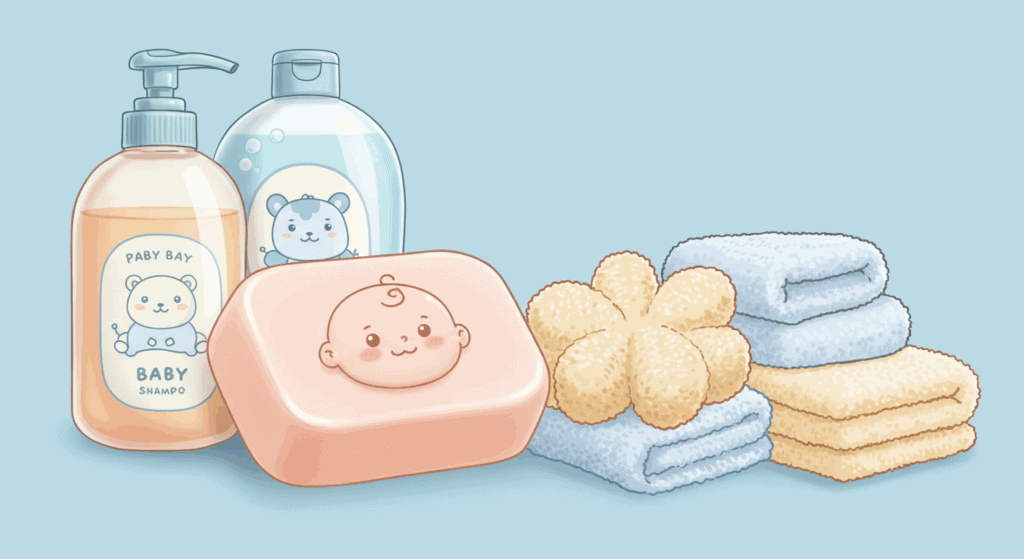
Look for:
- Hypoallergenic formulas.
- Natural oils like coconut or shea butter.
- pH-balanced cleansers and shampoos.
Avoid:
- Strong fragrances.
- Alcohol-based wipes.
- Adult creams.
Chikaro Picks:
- Baby-safe skincare kits (soap, lotion, shampoo).
- Soft baby washcloths.
- Natural oil blends.
Baby skincare basics remind us: a shorter ingredient list is usually safer.
When to Call the Doctor
Sometimes skincare goes beyond baby skincare basics. See a doctor if:
- Rash spreads quickly or forms blisters.
- Baby seems in pain or itchy.
- Rash comes with fever.
- No improvement after 3–5 days of gentle care.
Cultural Influences on Baby Skincare
In Nigeria, cultural practices like omugwo play a role in newborn care. Baby skincare basics help mums balance tradition with modern science.
Helpful traditions:
- Light soups for hydration.
- Coconut oil massages.
To be cautious with:
- Hot water massages (only after stitches heal, and water should be lukewarm).
- Harsh traditional soaps or herbs that may irritate.
Baby skincare basics guide mums to embrace culture safely.
Extra Tips for Nigerian Parents
- Build a skincare kit: Have lotion, oil, wipes, powder, and cream handy.
- Deal with dust: Wipe baby’s hands and face often during dry season.
- Travel tips: Carry a small bag with baby skincare basics like wipes, lotion, and balm.
- Myth-busting: Not every rash needs medication. Many resolve naturally with baby skincare basics.
Final Thoughts
Newborn skin isn’t perfect and that’s perfectly okay. Most rashes, dryness, or flakiness clear up on their own with time, patience, and simple routines.
Baby skincare basics are about being gentle, consistent, and safe. With Nigeria’s climate, adjusting routines for harmattan, hot weather, or humid months is key.
At Chikaro, we’ve curated baby skincare basics that actually work for Nigerian mums – from fragrance-free soaps to natural oils. Keep it simple, soothing, and safe, and your baby’s skin will thank you.

